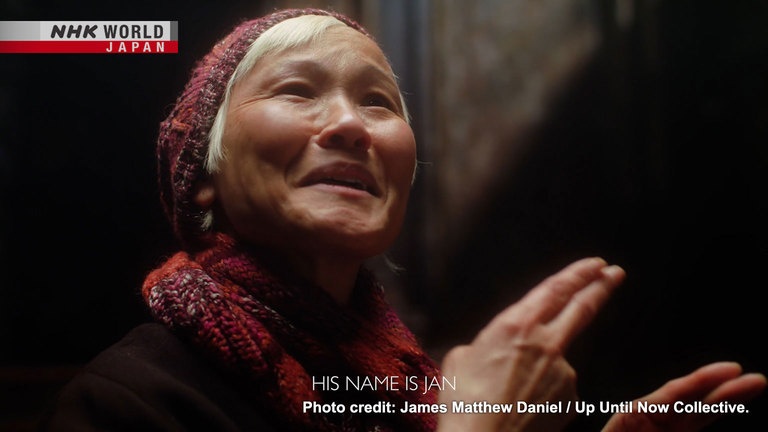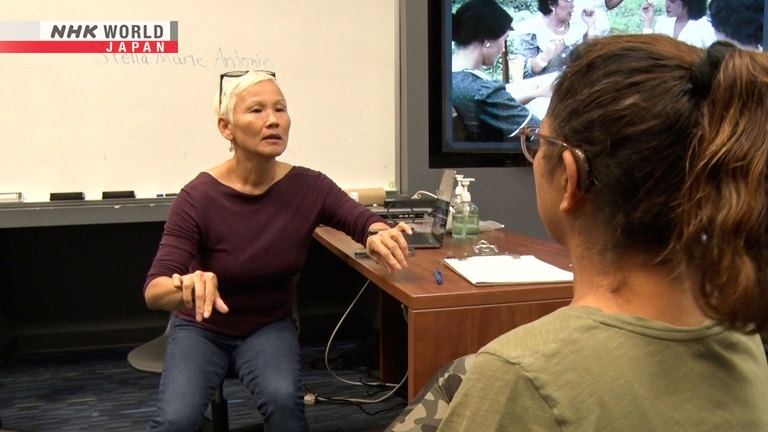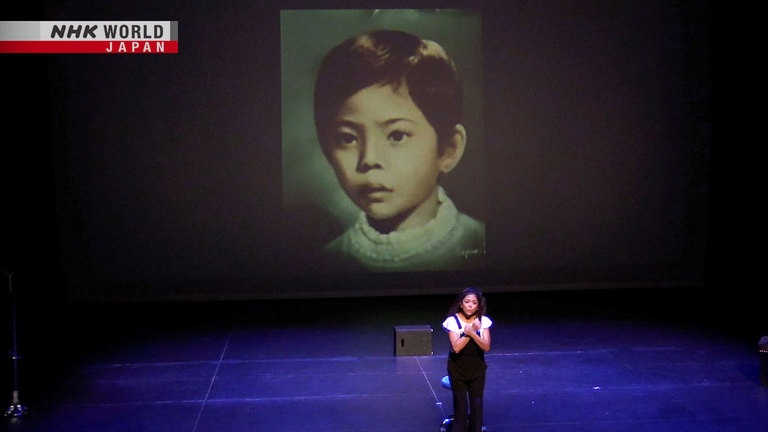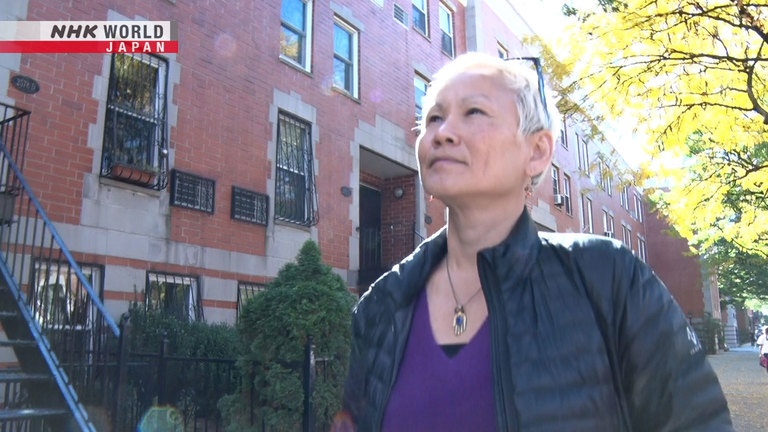Signs of Change for Deaf Performers: Monique Holt / Actor, Director, Writer
Deaf since birth, Actor/Director Monique Holt is cast in many roles usually reserved for the hearing. She leads a movement to make the theater world recognize the potential of those with disabilities.




Transcript
Direct Talk
One in 4 American adults
has some kind of disability,
making them the largest
minority group in the country.
Yet, in the performing arts,
people with disabilities are represented
less than any other group.
Making an impact to tip that scale,
Monique Holt is an actor,
director, and writer,
who has been deaf since birth.
As an actor,
she uses American Sign Language,
and visual gestures.
Jan, Jan, Jan
Funny name for a man
By performing many roles
conventionally played by hearing actors,
she has opened up opportunities
for Deaf actors and other performers
with disabilities.
Working in theater, you are either with
a Deaf- or a hearing- theater company.
But hearing theater companies
rarely have roles for deaf actors.
So, often, when I go to an open call,
I find that they won't be
looking for Deaf actors at all.
They're looking for actors in general,
but when I show up, the casting team
might say something like
"Oh, I never thought of including
a deaf character
in this commercial or TV show."
That's one of the reasons why I don't say,
"I only fit in this one hole."
There are so many different roles
that you can fit,
and they might change their minds.
With the growing vigor
of the social justice movement,
disability inclusion is gaining traction.
We asked Monique Holt about her work bringing
deaf culture into mainstream theater.
Signs of Change for Deaf Performers
I don't like the word "inclusion"
because it feels like
a disabled person is a burden
and they are being included
out of obligation.
"Oh, I have to include you
because you are different.
But you don't speak our language.
So, fine... We'll bring in an interpreter.
And now we're inclusive because we have
brought you in and you have an interpreter."
But that's not what
inclusion is really about.
I want to change that,
by looking through an intersectional lens.
Intersectionality has to be
part of the process.
So, it should be that
it's a group of people saying
"I want you and your unique contributions."
And then they realize
"You don't speak English,
but also we don't speak sign language,
so we're going to bring an interpreter
to benefit both parties
so that we can all communicate
which means that everybody
needs an interpreter,
not just you, the deaf person.
Interpreters are for everyone in the room."
Intersectionality is an analytical framework
for understanding how each individual
has unique intersecting identities,
such as their race, sexual orientation,
or disability.
Intersectionality is identities
that you can't separate.
I am not only a woman,
I am an Asian woman,
I am short,
I am all of these things together.
When you work all together, you can't
separate these different identities.
They're all intersecting.
Your identity is a holistic part of you.
For example, each flower
has individual petals.
And each petal can represent a person
with different backgrounds or identities.
It could be a disabled identity,
it could be an ethnic identity,
it could be a gender identity.
And all those individual petals come together
to create the flower of society.
We create that functioning society,
and using inclusion,
we can bloom together.
Holt has explored how dialogue is understood
without words being spoken.
When she directs a play,
she encourages deaf actors to develop what is
known as "visual-gestural communication,"
which relies on universal gestures,
facial expressions
and body language to communicate information.
You have to be Deaf to understand
that there are different nuances,
that a hearing person
cannot necessarily relate to,
like Visual Vernacular.
If you ask a hearing person
most of them won't know what it is.
Or visual-gestural communication.
These types of expressions
are not in their vocabulary,
but here, I'm working with a Deaf actor
to really get those gestures out
and using visual body acting
to show these tiny nuances,
because it's all based on
body-movement technique.
This play Holt recently directed
is an autobiographical one-woman show,
written and performed by a Deaf actor.
To convey the experience of
the main character to the general audience,
the performance includes
a wide range of visual tools.
"In the eyes of a deaf child,
curling up,
pushed, pushed away,
confused,
just prayed to be just like you."
Being able to speak English
doesn't make you an actor.
It's the same with a Deaf person
who uses sign language.
It doesn't make them an actor
just because they're Deaf and they can sign.
Can they move?
Can they do puppetry?
Can they mime?
Can they sign music?
Can they convey an emotion?
You have to find your own medium.
Maybe you can use all of them.
Monique Holt was born in Korea
and grew up in an orphanage.
At age three, she was adopted by
a Deaf American couple.
In her new life in the United States,
she loved to watch television.
One day, she saw a broadcast
of a performance of the ballet,
Swan Lake.
I was about four at that time.
I fell in love with the idea of
the movement, the rhythm, the costumes,
and I wanted to be a dancer when I grew up.
And I told my father
that I wanted to do that.
My father said
"But you can't hear the music.
You can't do that job."
And I accepted that at face value.
But when I was alone in my room,
I would dance and I would move a lot myself.
So I never really gave up
that desire to dance.
It was always there.
After graduating from a high school
for Deaf students,
Holt moved to New York City
to take dance classes.
Eventually, she decided to study acting
and enrolled in the theater program
at New York University.
She was the only Deaf student there.
I loved being in that program.
I have no regrets.
It was the best decision I ever made.
Being deaf didn't bother me.
I had an interpreter the whole time.
My junior year at NYU,
I really, really wanted to
work with a specific director.
He was assigning roles to all the actors.
When he came to me,
I was the very last person to receive a role.
And he told me,
"Oh, I'm sorry, I don't have a role for you."
And I was like, uh...okay.
But he said,
"I'm going to give you the opportunity
to create a character for yourself,
the Girl."
I was arrogant back then.
I thought, "Oh, okay."
And in my mind, I thought
"That's gonna be so easy."
As I was developing my character,
I realized it was not an easy thing to do.
I had to figure out how to be
part of the existing story,
which was really befuddling.
How?
Who was a character that I could play with?
And I started that negotiation,
without distracting from
or losing any of the story.
Man, that was really challenging.
And after that,
I found my character within the story.
And I was really proud of that.
Then, when we had a cast party,
the director came up to me
in private and said,
"You are an actor.
You have to set up
your own deaf theatre company."
I didn't want to.
I didn't want to be stuck running a company,
not just, not because I'm Deaf.
I love the Deaf community.
I just felt I could do more than
just running a company.
And I think that's still true.
In August 2022,
the Lincoln Center in New York City
staged an outdoor performance titled
"Inside/Out...
Voices from the Disability Community"
What do people think?
What do people think of
when they hear the word "disability?"
- "Handicapped"
- "Lame"
"Moron."
The performers,
who had various disabilities,
played themselves and shared their stories.
Holt was one of seven to appear on stage.
"People learn that I cannot hear,
they label me "disabled."
Conversation is a two-way street.
If people lack the ability
to adapt my language,
then their lack of flexibility
makes me disabled."
"Most Americans don't have to
think about disability,
but most Americans will have a disability
at some time in their lifetime."
"Paradoxically, I think disability
has a potential to shed light on
what it is to be human.
The courage it takes sometimes
simply to live."
"There are more of us demanding visibility,
more of us refusing
to be pegged into one category.
Now I hope the next step is for performers
with disabilities to write our own stories,
about us,
by us,
for us."
Holt says the Covid-19 pandemic
was a game changer
for advancing disability inclusion.
I do think that the pandemic
absolutely influenced
and helped us all slow down
and prioritize taking care of yourself
and saying whatever
you need to say as a person.
I've noticed people saying,
"Oh, I muted myself."
And then they realize, muting and unmuting,
you have power in that.
And now people are starting to acknowledge:
"Oh, I have the power to spotlight someone.
I'm able to include,
focus on, and actually think about
someone with a disability
– instead of shunning them.
I recognize the skills
this disabled person has to contribute,
and I can bring them on as well."
And I think disabled people have become
more brave since the pandemic,
in saying "I can do that.
What's stopping you from hiring me?"
You can do it.
And we should continue
to explore and not stop.
Holt is now turning to her next big project,
directing a new musical.
Its title is "Hear Me."
It's a love story between
a hearing man and a Deaf woman,
who is also a single mother.
The cast consists of hearing and Deaf actors,
and the show incorporates
sign language, gestures, and captions.
I'm very excited.
It's interesting.
When I read the script
for this piece, I liked it
because the main character is not deaf
but emotionally disabled.
And I thought that was a really a cool take.
In the story, the main character
meets a Deaf person,
and he confronts his emotions while
dealing with their communication barrier.
And that is what real life
looks like in a lot of ways.
So I think that's really cool.
Working in theater for over three decades,
Holt has developed allies in
both the hearing and Deaf communities.
She's bringing these forces together
to create more shows that represent
the true humanity of all people.
I definitely see change.
I think there were already moments
of exposure along the way.
And perhaps I broke through
in a way for some folks to realize
that it's possible to do
some of the things that I do.
"Oh, I can hire a deaf actor.
I can do this thing."
I might have affected that kind of change.
I just want to work,
keep creating shows,
keep doing theater,
to get people together,
and keep teaching each other.
We asked Monique Holt to share some words
that drive her forward
in her creative pursuits.
She has written a quote
from playwright Tom Stoppard.
"Every exit is an entry somewhere else."
When I lose an opportunity,
I always remind myself that there is
another opportunity on the way.
"Every exit is an entry somewhere else."
- Tom Stoppard